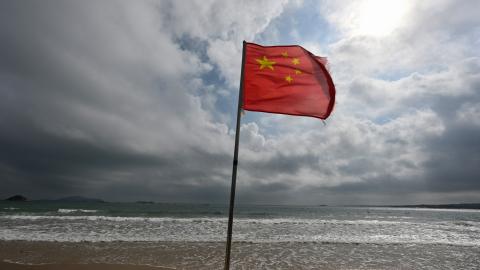By any measure of international affairs, few issues are as consequential or as misunderstood as the Chinese Communist Party’s belligerence toward Taiwan. Although Western analysts often frame the Taiwan Strait crisis as a legacy of an unfinished civil war or a matter of national reunification, this perspective misses the ideological, strategic and existential foundations of the CCP’s obsession with the island democracy. To fully grasp the threat, we must uncover the deeper drivers behind Beijing’s ambitions and recognize Taiwan’s pivotal place in the CCP’s global design.
For the Chinese Communist Party, Taiwan has never been a mere provincial concern or a nationalist grievance. Rather, the conquest of Taiwan is the unfinished chapter of the “War of Liberation,” not a civil war but a sacred ideological mission.
From the CCP’s perspective, its legitimacy as the last vanguard of global communism hinges on completing this task.
After the collapse of the Soviet, Cuban and Eastern European communist regimes, the CCP exclusively sees itself as communism’s final torchbearer. It is precisely in this messianic self-perception that Taiwan becomes indispensable.
It may sound bizarre to ordinary Americans unaccustomed to alien communist ideological gobbledygook, but in CCP orthodoxy and its daily domestic propaganda shriek, the world is still enslaved by capitalist imperialism, led by the United States.
In this narrative, Taiwan is the “lost island,” a defiant symbol of freedom that must be subdued for the communist world order to be complete. Failure to seize Taiwan would signify ideological defeat and unravel the very philosophical legitimacy of the CCP’s rule.
The West, however, has consistently failed to understand this ideological fervor. The prevailing narrative is centered on national reunification or residual civil war disputes, which obscures the ideological compulsion behind the CCP’s aggression.
By calling it “the Taiwan issue,” we diminish its true significance in the CCP’s worldview. We overlook that the CCP does not merely want to reunify; it seeks to “liberate.” That is, to conquer and subjugate Taiwan in the name of a failed ideology whose only surviving claimant is Beijing itself.
Misframing China’s belligerence toward Taiwan plays directly into the CCP’s hands, allowing it to veil its expansionism under the cloak of nationalism while the world indulges in euphemisms and strategic ambiguity.
Beneath this ideological drive lies a nakedly geopolitical ambition: the destruction of U.S. global leadership. Taiwan is the anvil upon which the CCP plans to hammer the U.S.-led world order. The immense military buildup by the People’s Liberation Army is not merely aimed at Taipei; it is designed for an epochal confrontation with Washington and its allies in the Indo-Pacific.
The Taiwan invasion plan is not about just land; it is about rewriting the map of global power. The PLA’s unparalleled preparations, including hypersonic weapons and cyberwarfare doctrines, signal that Beijing sees the Taiwan campaign as a prelude to something much larger: the dismantling of American military and technological superiority and, with it, the liberal international order.
Moreover, Taiwan is a glittering jewel in the CCP’s crosshairs not merely for geography but also for its staggering concentration of human capital, industrial brilliance and technological supremacy. TSMC, the crown jewel of global semiconductor production, represents a technological lifeline for Taiwan and for the entire digital infrastructure of the democratic world.
Seizing Taiwan means gaining leverage over the technologies that define the 21st century: artificial intelligence, medical innovation, quantum computing and beyond.
Taiwan has produced tech legends such as Jensen Huang, Lisa Su, Robert Tsao, Morris Chang, Jerry Yang, and many others revered in Silicon Valley and worldwide. The CCP is not blind to this; it sees Taiwan not just as a territory but also as a treasure chest of innovation that must be looted.
Yet the greatest “threat” Taiwan poses to the CCP may be philosophical, not military or technological. Taiwan is living, breathing proof that a free, democratic, ethnically Chinese society can thrive without communist rule.
This reality — that Taiwan is a beacon of civil liberties, democratic governance and human dignity — presents an existential challenge to the CCP’s authoritarian model.
To the 1.4 billion Chinese living under censorship, repression and propaganda, Taiwan offers a mirror of what could be, and mirrors are dangerous for dictators.
For the CCP to endure, Taiwan must be erased not just from the map but also from the imagination of the Chinese people. The survival of a democratic Taiwan is the greatest subversion that the CCP cannot tolerate.
In international diplomacy, the CCP has weaponized the Taiwan issue as a convenient smokescreen. Every time global outrage erupts over Chinese human rights abuses, fentanyl flows, technological theft or authoritarian overreach, Beijing reflexively redirects the conversation to Taiwan. Like a magician’s misdirection, it keeps the world fixated on “not hurting the feelings of the Chinese people” while systematically avoiding accountability.
This strategy has worked all too well. Western leaders, terrified of diplomatic fallout, often self-censor or prioritize “strategic patience” over principled clarity.
Let’s be clear: The CCP’s obsession with Taiwan is not about feelings. It’s about fear that its brutal regime cannot withstand a free and prosperous China across the strait.
It is time for the world to stop playing along with the CCP’s narrative. The belligerence toward Taiwan is not an issue of heritage or national pride. It is a doctrine of conquest, a strategy of global domination and a defense mechanism of an insecure regime built on lies.
Only by exposing the ideological, strategic and moral fragility of the CCP can the democratic world confront its challenge with clarity. Taiwan is not a bargaining chip. It is a bulwark against tyranny. If we allow Beijing to snuff it out, we won’t just lose an island. We’ll lose the compass of freedom in Asia.
Let us call the CCP’s bluff, see through its grand calculus and defend Taiwan not only for its own sake but also for the crucial interest of the United States and, ultimately, the future of liberty itself.


















